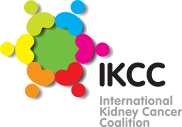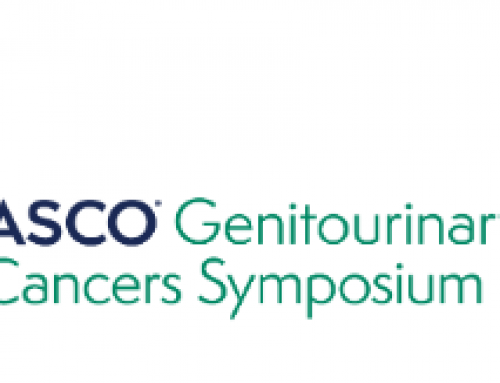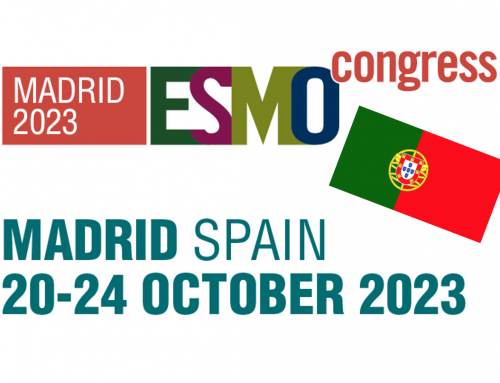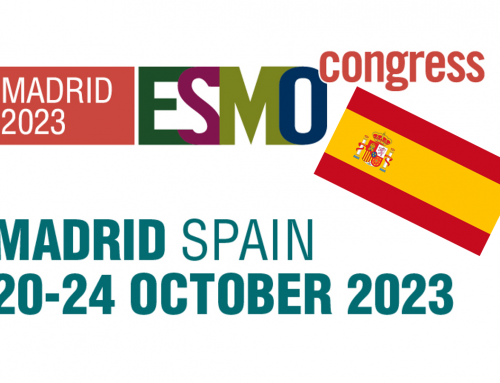As a result of the COVID-19 pandemic, this year’s European Society of Medical Oncology (ESMO) congress was held virtually from 19-21 September 2020. The virtual presentations are available to view on the ESMO website if you have previously logged in to the site. The International Kidney Cancer Coalition (IKCC) attended the virtual scientific programme to keep abreast of the latest advances in the care and treatment of people with kidney cancer.
Please note: The following summary was prepared by patient advocates for the benefit of patient organisations around the world who focus on kidney cancer. While this summary has been medically reviewed, the information contained herein is based upon public data shared at this meeting and is not intended to be exhaustive, or act as medical advice. Patients should speak to their doctor about their own care and treatment.
Combination therapies continue to define RCC treatment
Dr Toni Choueiri from Dana Farber Cancer Institute in Boston, USA presented the results of a large clinical trial called CheckMate-9ER. This trial compared the combination of the immune checkpoint inhibitor nivolumab together with the blood vessel blocking (antiangiogenic TKI) agent cabozantinib versus the antiangiogenic agent sunitinib in kidney cancer patients who had recently been diagnosed, had not had any treatment, and whose cancer had spread to at least one other organ. A total of 651 patients were randomly assigned to either get nivolumab/cabozantinib or sunitinib. Patients stayed in the trial until either their kidney cancer got worse or until the side effects became too hard for the patient. Most patients were followed for around 18 months.
The trial mainly wanted to test how long it took for their kidney cancer to get worse (progression-free survival). Researchers also wanted to know how these treatments compared in how long patients survive, how their tumours responded, and what side effects patients experienced.
The results of this trial showed that progression-free survival was doubled among patients randomised to nivolumab plus cabozantinib (16.6 months) compared to those randomised to sunitinib (8.3 months). Similarly, patients randomised to nivolumab plus cabozantinib lived significantly longer than those receiving sunitinib.
More than half of the kidney cancers (and metastases) shrank in the group of patients taking nivolumab/cabozantinib (55.7%), whereas in the group taking sunitinib, 27.1% of the cancers shrank. In 8% of the patients taking nivolumab/cabozantinib, their cancers even disappeared, compared with 4.6% of the patients taking sunitinib.
Both groups experienced side effects, but nothing new showed up that had not previously been seen with these drugs. The side effects were considered to be manageable. Patients taking nivolumab/cabozantinib had worse side effects, and 19% of the patients needed corticosteroids to help them.
Dr Choueiri concluded that CheckMate-9ER showed that nivolumab plus cabozantinib is better than sunitinib in the first-line treatment of patients with advanced kidney cancer and supports this approach as a new treatment option for these patients.
Follow-up data from the nivolumab-ipilimumab study CheckMate-214
Over the past 2 years, the use of two drugs combined together (combination therapies) for untreated patients with RCC that has spread (metastatic RCC) has become the main treatment for these patients. The first combination was with the immune checkpoint inhibitors nivolumab plus ipilimumab, which helped patients with high risk RCC live longer than those patients who were on sunitinib (CheckMate-214). Shortly after, two immunotherapy/targeted therapy combinations were approved, and showed how much better avelumab and axitinib and pembrolizumab and axitinib were compared to sunitinib in metastatic RCC.
At this year’s ESMO virtual congress, Dr Laurence Albiges from Institut Gustave Roussy in Paris, France presented long-term data from the CheckMate-214 trial comparing nivolumab and ipilimumab to sunitinib, with a focus on a group of patients who had not had their kidney removed (nephrectomy).
The combination of nivolumab and ipilimumab continued to improve survival in patients with high risk disease, but there was no improvement in patients with low risk disease. However, none of the patients had a complete response to treatment.
Patients who have not had surgery and who still have a kidney tumour live longer when treated with nivolumab/ipilimumab (26.1 months) compared to sunitinib (14.3 months).
Dr Regan from the Dana Farber Cancer Institute in Boston, USA also presented long-term data (42 months) from the CheckMate-214 trial, with a focus on treatment-free survival and side effects.
Previous studies have shown that patients may have long periods where their disease is stable without having to take drug treatment; however, they may also experience side effects during this time. This study looked into this effect in more detail. The researchers used data from the CheckMate-214 study, which compared the nivolumab/ipilimumab combination to sunitinib in 1096 patients with advanced clear cell RCC.
After 42 months of follow-up, 56% of patients on nivolumab/ipilimumab and 47% on sunitinib were alive. Thirteen percent (13%) stayed on their nivolumab/ipilimumab treatments and 7% stayed on their sunitinib treatment. Thirty one percent (31%) of patients on nivolumab/ipilimumab and 12% on sunitinib survived without further drug treatment.
Treatment-free survival was higher for patients who were randomised to receive nivolumab/ipilimumab (7.8 months) than those randomised to sunitinib (3.3 months). Treatment-free survival without side effects was 7.1 months and 3.0 months, respectively.
Treatment of non-clear cell RCC remains a big area of interest
Two studies investigating treatments for non-clear cell forms of kidney cancer were presented at the ESMO virtual congress this year.
Non-clear cell RCC is about 20-25% of all RCC diagnoses and usually has worse survival than clear cell RCC. Both cabozantinib and immune checkpoint inhibitors have been shown to help patients with non-clear cell RCC.
Results from COSMIC-021 were presented by Dr Bradley McGregor from the Dana-Farber Cancer Institute in Boston, USA. COSMIC-021 is a multi-centre phase 1b study looking at whether a combination of the antiangiogenic TKI cabozantinib with the immune checkpoint inhibitor atezolizumab can help patients with various solid tumours.
Thirty (30) patients were enrolled and followed for around 13 months. Sixteen (16) patients (53%) remained on treatment. There were 15 papillary, 7 chromophobe and 8 other non-clear cell subtypes.
Ten (10) patients (33%) had a partial response to the treatment. There were no complete responses and the treatment controlled the cancer in most patients (93%). The response lasted 7.9 months and patients survived 9.5 months without their cancer getting worse.
Thirty percent (30%) of patients had severe or life-threatening side effects and there were no deaths.
In conclusion, cabozantinib plus atezolizumab extended survival in patients with non-clear cell RCC and was safe. Several subtypes of non-clear cell RCC responded to treatment. Further trials are ongoing with this combination of treatments following treatment with immune checkpoint inhibitors, including patients with papillary or unclassified non-clear cell RCC.
Dr Ram Srinivasan from the National Cancer Institute in Bethesda USA presented an update of the clinical data from the phase 2 study of oral MK-6482 in Von Hippel-Lindau (VHL) cancers.
Von Hippel-Lindau disease is caused by a change (mutation) in a gene called the VHL gene. It causes both benign (non-cancerous) and malignant (cancerous) tumours, including clear cell RCC. It is very rare and recruitment into clinical trials is difficult. Currently, surgery is the main treatment; kidney and pancreatic tumours less than 3 cm in diameter are removed to limit the risk of spread of the disease and avoid kidney problems due to multiple tumours in the kidney.
Data from 61 patients treated with a drug called MK-6482 were summarised. MK-6482 blocks a substance called HIF-2a, which is inappropriately elevated if the VHL gene is mutated, resulting in the formation of tumours. Overall, over a third of patients responded to MK-6482 and over 90% of tumours reduced in size. So far, no patients have progressive disease.
MK-6482 is being considered for approval by the US Food and Drug Administration (FDA) in patients with VHL disease. Additional studies are needed to understand its efficacy in advanced disease, and to see if the drug might be more effective in combination.
Biomarkers for the treatment of advanced RCC
Biomarkers enable doctors to predict which patients will respond to which drugs and have an important role predicting survival. However, a good biomarker has not yet been found for RCC. Unfortunately, there have been many challenges, and there remains a need to identify biomarkers to guide treatment decisions and monitor treatment response in patients with metastatic RCC.
Two papers presented during ESMO summarise the work done to determine biomarkers for advanced RCC. One study assessed the levels of circulating cell-free tumour DNA (ctDNA) in 847 patients with metastatic RCC and followed this up with testing tumour tissue. The study showed that ctDNA was associated with the outlook for cancer patients with different types of tumours who had been treated with immunotherapy.
Throughout treatment, any increase above ctDNA baseline levels indicated rapid disease progression and poor survival. ctDNA levels below baseline levels indicated a mixed response. In conclusion, ctDNA analysis is possible in patients with metastatic RCC.
Results from the phase 2 BIONIKK trial with nivolumab, nivolumab/ipilimumab combination or a VEGFR TKI in untreated metastatic RCC patients showed that biomarkers could be used to guide treatment in untreated patients with clear cell RCC that had spread. The trial included 154 patients treated with nivolumab or nivolumab/ipilimumab combination or a VEGFR TKI. Patients whose tumours were considered “immune-low” and “immune-high” had poor outcomes with sunitinib. Patients who had “angio-high” and “normal-like” tumours had favourable outcomes with sunitinib.
Both papers conclude that biomarkers in advanced RCC have not been shown to be clinically useful and further research is needed to identify the genetic mutations involved in RCC tumours.
Acknowledgements:
Medical Reviewers:
Dr Rachel Giles (NL)
Dr Michael Jewett (CA)
Dr Eric Jonasch (USA)
Medical Writer:
Dr Sharon Deveson Kell (UK)




